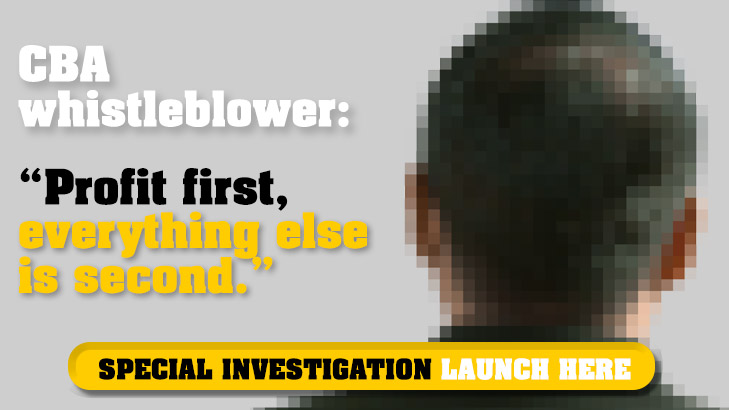CommInsure's 'nastiness'
Arthritis patient Michael Gill says CommInsure wanted him to cease his medication so his bones would deform to prove his claim.
PT2M7S 620 349Hidden cameras, investigators parked outside the house, 24/7 secret cameras and unannounced home visits sounds like something out of James Bond movie.
Think again. These are some of the surveillance tactics endorsed by the Commonwealth Bank's life insurance arm in 2013 as it investigated hundreds of its claimants.
It might be legal, but it raises ethical and moral issues.
It can be revealed that in the second half of 2013 CommInsure went on an all-out assault on the privacy of its policyholders by increasing the number of claims under surveillance by a massive 48 per cent to 366 investigations in a six-month period, according to an internal risk committee meeting held in November 2013.

CommInsure increased the number of claims under surveillance.
There was a big spike in August 2013 volumes "because of a project involving external investigators on our panel performing additional 'intel' surveillance tasks".
To put the insurer's surveillance policy into perspective, the number of referrals made to CommInsure's investigation's team jumped from 42 to a whopping 457 during a six-month period.
The 2013 internal risk committee meeting at CBA's scandal-ridden life insurance referred to a new initiative CommInsure had introduced in 2012, known as a "static surveillance initiative", which records on camera 24/7 the comings and goings of a residence. Controversially, it said it would "progress a home visitation initiative (unannounced) that we are currently discussing with Wholesale Claims".
It said: "A profile of claims that would benefit from this is being developed – eg low benefit amount income protection claims with some red flags that do not warrant the cost of a full, standard investigation."
At the time CommInsure's full-year profit had fallen almost 8 per cent to $320 million, largely due to higher policy lapses and a continuation of high claims.
Getting aggressive
A blowout in claims in 2013 was an industry-wide phenomenon, according to Josh Mennen, a legal expert in life insurance at Maurice Blackburn. Mennen says members of industry funds became aware for the first time they had cover through their super funds.
"The insurance industry's reaction was to become aggressive on claims. One of the tools they use is surveillance, others included tightening the definition on total and permanent disability definitions to make it more difficult to claim," he says.
Revelations of the extent of CommInsure's surveillance activities in 2013 come as the life insurer struggles to repair its battered reputation following a series of explosive allegations raised in a joint media investigation with Fairfax Media and Four Corners.
Allegations include selling policyholders policies that contain out-of-date policy definitions and then using that definition to decline claims, manipulation of medical reports, missing files and "artificial" declining of claims that should have been accepted.
The allegations were raised by former chief medical officer Dr Benjamin Koh who has since filed a writ against the bank for wrongful dismissal.
The bank alleges his sacking in August 2015 had nothing to do with his being a whistleblower but due to issues including a breach of company IT policy.
In a statement, CBA said: "We investigate around 2 per cent of all claims annually. Investigations take many forms, and often involve desktop research of publicly available information. This helps us understand the particular concerns of the customer or the circumstances leading to their claim."
A spokesman said if there were particular matters brought to CommInsure's attention concerning surveillance, "we are happy to have these considered within the review that will be conducted by an independent party, announced by the CommInsure Board this week".
The spokesman said under CommInsure's current policy, home visits generally occur in consultation with the customer.
Issues beyond legal
Surveillance is a sensitive issue. It might be legal, but it raises ethical and moral issues.
In some cases it can be detrimental to the mental state of a claimant.
It is why the life insurance code – a voluntary code that is being developed by the $44 billion industry – needs to include a standard for surveillance.
The industry has developed a draft but the verdict from consumer groups is that it doesn't go far enough.
It is why beyondblue chairman Jeff Kennett said recently: "I would not, with due respect, trust a life insurance organisation to develop a code that puts the public's interest first."
There should also be a ban on unannounced visitations to a person's home. It crosses the line. There is no doubt that some claims are fraudulent and insurers should investigate them.
But the idea of hiring an investigator to secretly film or drop into a claimant's home unannounced when that claimant is at their most vulnerable needs to have some stricter standards around it.






























20 comments so far
More comments
New user? Sign up
Make a comment
You are logged in as [Logout]
All information entered below may be published.
Thank you
Your comment has been submitted for approval.
Comments are moderated and are generally published if they are on-topic and not abusive.